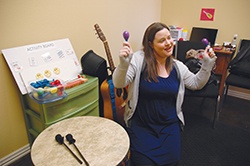Music Therapy Poised to Make Impact on Medical Industry
by December 9, 2013 12:00 am 129 views

Music has been viewed as a source of healing since Ancient Greece. Various cultures have utilized the element of song to treat mental disorders. Music rooms were common features in 13th century Arab hospitals, and Native American medicine men used chants and dancing for healing.
The form of music therapy now used was born in the wake of World War I, when music was used to treat patients with what is now called post-traumatic stress disorder.
Confined to the periphery of medical practice, among holistic and alternative approaches, music therapy as an industry has yet to be fully embraced by mainstream medicine.
However, in recent years, public awareness of the therapy has exploded — partly due to an influx of media attention — and people are starting to take it seriously.
Local music therapist Carrie Jenkins says the growing interest in the field is evident not only in the number of people seeking therapy, but also in the number of students studying to become music therapists.
Music therapy might seem as simple as playing an instrument to someone who is sick, but a lot more goes into it. Therapists must have a deep understanding of each client’s individual needs. It’s a medium to help clients in many ways — and the experience is often fun.
“They might think we’re playing a cute little song, but they’re learning,” said Jenkins, who has taught in special education classes and also sees individual clients in her office at Cardinal Care Center in Farmington.
Children and adults with learning disorders or delays can learn, for example, basic language and math concepts through a curriculum called “Tuned In To Learning.”
People learn quicker and remember better when something is put to song. Those with Down syndrome or other disabilities also may play instruments to help with fine and gross motor skills.
In addition, music is a global process, tapping into many areas of the brain at once. A particular song or style of music is often tied to deep emotions and can have a powerful effect.
Playing a Tennessee waltz might prompt an elderly man with dementia who had not stood up or communicated with anyone in months to get up from his wheelchair and dance with his wife — as it did in a story told to Jenkins by an instructor at school.
Therapy is available on a private-pay basis. Jenkins is interested in accepting insurance and Medicaid but is waiting to see the effects of the Affordable Care Act.
Jenkins has private contracts with Katherine’s Place and Culpepper Place retirement homes in Fayetteville. Residents play instruments that help tune their motor skills and hone cognitive skills by mimicking when Jenkins starts playing a hand drum. She might perform a lyric analysis of a popular song from when they were young, tying it into the here and now. She encourages solos in an effort to boost self-confidence.
The first time a boy with autism came to Jenkins’ office, he hid behind his mom. But now, he bursts into the room and says, “Hi Ms. Carrie! Let’s do music!” Parents say children never open up as much in other therapies.
Jenkins might help a schizophrenia patient choose a song to calm them when they feel agitated. Music can help clients grasp social skills and express emotion.
Although the field has surged in larger metropolitan areas, Jenkins is the only musical therapist in Northwest Arkansas and one of two in Arkansas. She is a trailblazer in terms of figuring out the logistics of her business.
